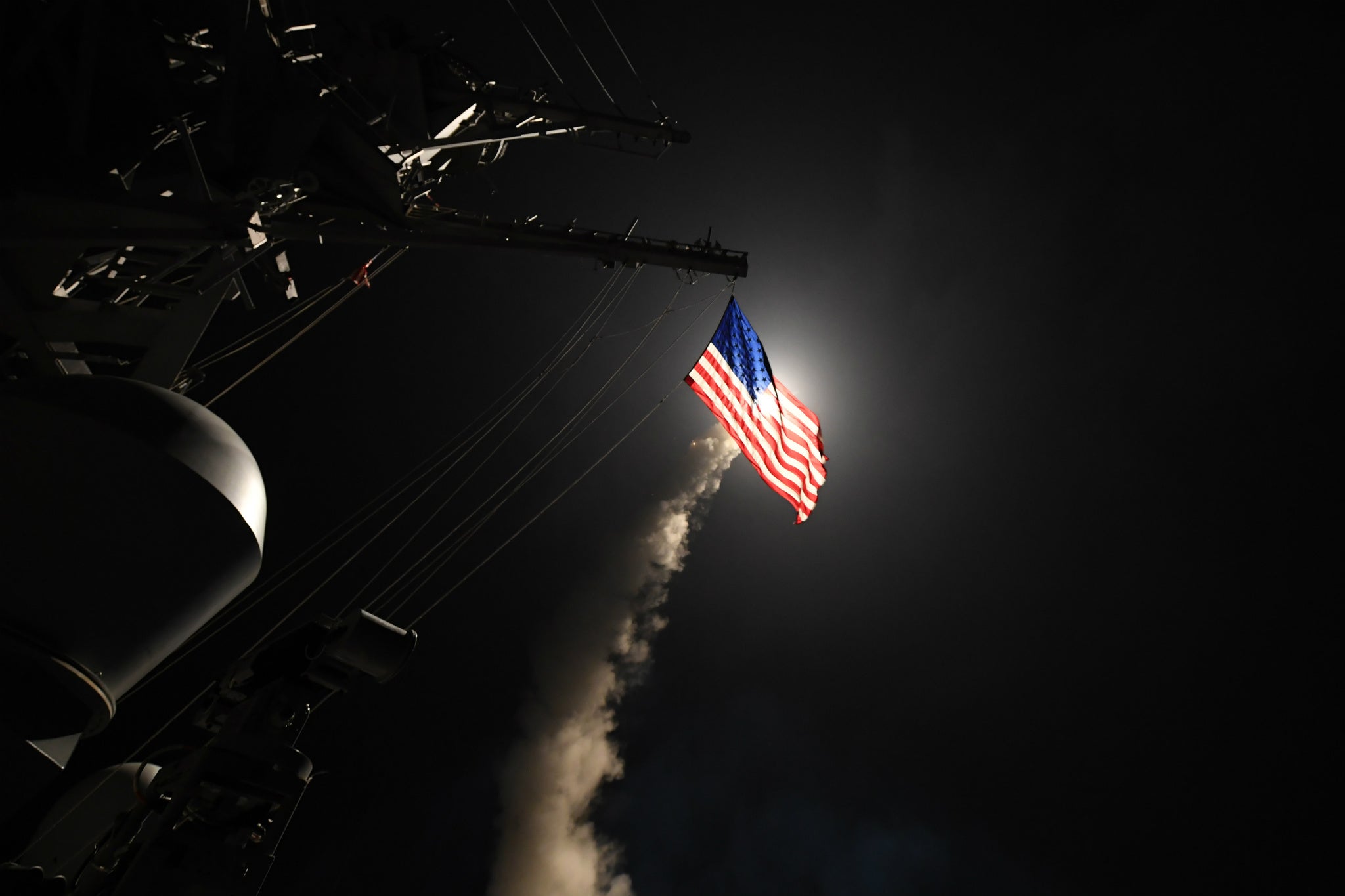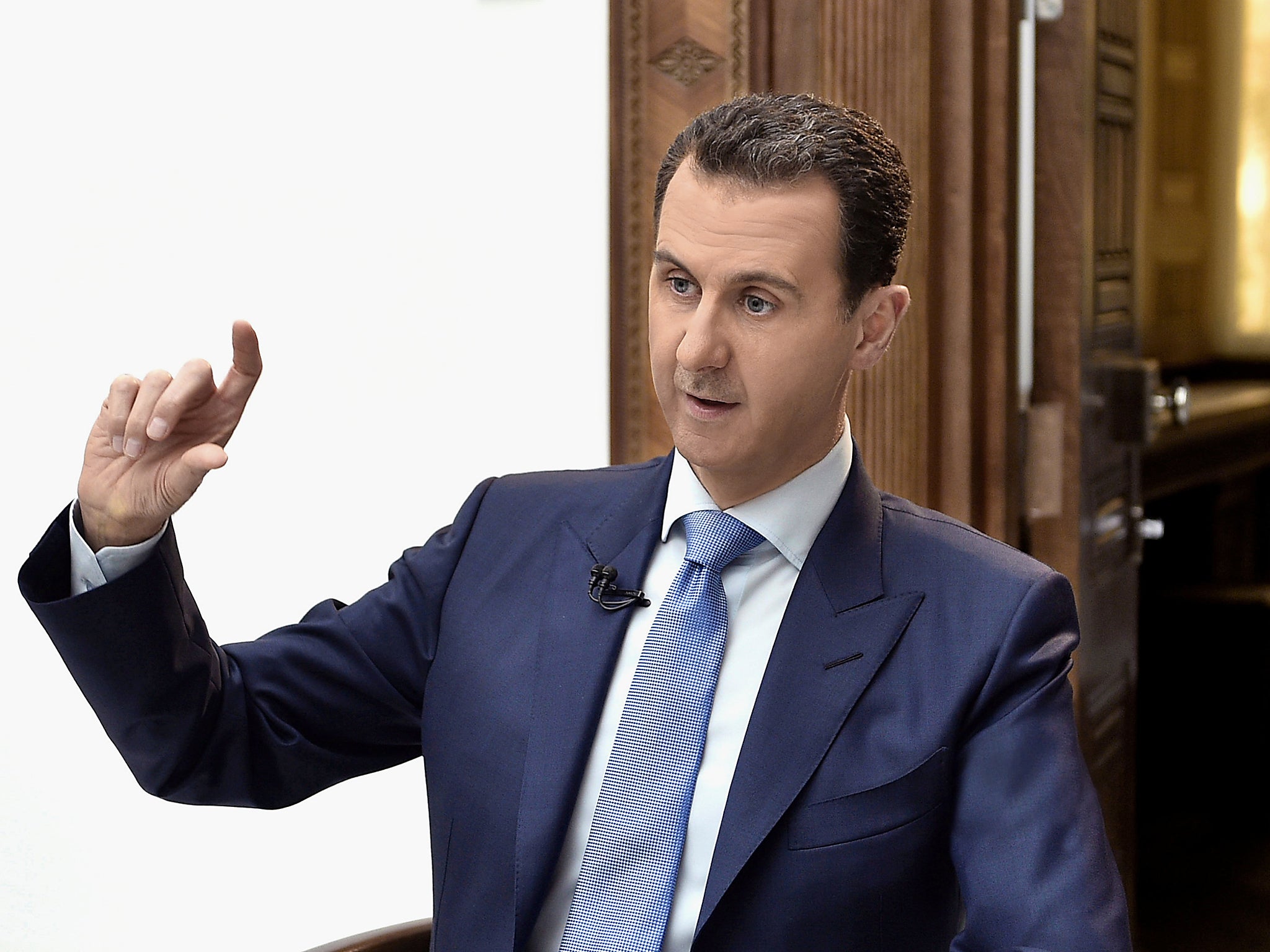Britain could join US in Syria air strikes against Assad without parliamentary approval, Boris Johnson says
Foreign Secretary says it would be 'difficult to say no', despite 2013 vote against intervention

Your support helps us to tell the story
From reproductive rights to climate change to Big Tech, The Independent is on the ground when the story is developing. Whether it's investigating the financials of Elon Musk's pro-Trump PAC or producing our latest documentary, 'The A Word', which shines a light on the American women fighting for reproductive rights, we know how important it is to parse out the facts from the messaging.
At such a critical moment in US history, we need reporters on the ground. Your donation allows us to keep sending journalists to speak to both sides of the story.
The Independent is trusted by Americans across the entire political spectrum. And unlike many other quality news outlets, we choose not to lock Americans out of our reporting and analysis with paywalls. We believe quality journalism should be available to everyone, paid for by those who can afford it.
Your support makes all the difference.Boris Johnson has said Britain could join US air strikes against the “monster” Bashar al-Assad’s regime in Syria, despite a previous vote against intervention.
The Foreign Secretary said the UK had been informed in advance of Donald Trump’s order to bomb the airbase used to launch a suspected chemical attack, but was not involved.
He added: “It is my belief, though I stress no such decision has yet been taken, that were such a request to be made in future, were it to be a reasonable request in pursuit of similar objectives, then I think it would be very difficult for the United Kingdom to say no.”
Shayrat airbase, in central Homs province, was hit by 59 Tomahawk cruise missiles fired by US warships in the early hours of 7 April, destroying regime planes and infrastructure.
Theresa May welcomed the strikes, as did European allies including Germany and France, but the Conservative Party is reportedly divided over the extent to which Britain should be involved in any future operations against Assad.
The former foreign minister Alistair Burt had pressed Mr Johnson on what his response would be to a similar request in the future and asked whether the Government felt “bound” by a previous vote in 2013.
David Cameron called for military action against the Syrian government in the wake of a sarin attack that left hundreds of civilians dead on the outskirts of Damascus, but narrowly lost a Commons vote by 285 to 272.
Parliament later approved a limited British air campaign against Isis and other terrorist groups in Syria and Iraq, but concerns are mounting that operations could become more dangerous following Russia’s suspension of an accord aiming to avoid mid-air conflict.
The Government has shown no sign of putting anti-Assad intervention to MPs for a second time, despite international condemnation of another suspected sarin attack in the rebel-held town of Khan Sheikhoun earlier this month.
“We know beyond doubt that two Sukhoi-22 aircraft took off from Shayrat airfield where we know that chemical weapons are stored,” Mr Johnson told MPs on Tuesday.
“We know that they were overhead at 6.39am when according to all eyewitness accounts the attack took place.
“We know from shell fragments in the crater that not only had sarin been used, but sarin carrying the specific chemical signature of sarin used by the Assad regime.”
Both the Syrian and Russian governments have denied that Assad’s government uses or possess banned chemical weapons, but analysis by doctors treating victims has found evidence of nerve agents.

The Foreign Secretary said there was “only one conclusion, that the Assad regime almost certainly gassed its own people in breach of international law and the rules of war”, showing disregard for an agreement to destroy its stockpiles in 2013.
Mr Johnson called on Russia, which acted as a guarantor for that accord on chemical disarmament, to end its “blind support” for Assad and help work towards a political solution to the six-year Syrian civil war.
Supporting Mr Trump’s strikes, he claimed they “create an opportunity to break the deadlock“ and pave the way for a political settlement and a truce, following a succession of failed ceasefires.
Emily Thornberry, Labour’s shadow Foreign Secretary, criticised Mr Johnson for cancelling a scheduled visit to Moscow when diplomacy was most needed, but he insisted he was still in touch with his counterparts.
When questioned whether removing Assad would merely pave the way for an Islamist regime, Mr Johnson said there was “no future” for the Syrian dictator given his war crimes.
“The essential thing will be to have a political process that preserves the institutions of the Syrian state while decapitating the monster,” he added.
Mr Johnson said that both the Syrian and North Korean governments “threaten the law-based international order”, just hours after Damascus listed Kim Jong-un among the world leaders congratulating Assad on independence day.
North Korea attempted another missile launch over the weekend, following a huge military parade that saw what appeared to be new inter-continental ballistic missiles rolled through Pyongyang in front of cheering crowds.
The isolated nation has boasted of its attempts to create a missile capable of delivering a nuclear warhead to the mainland US, vowing to “annihilate” targets if American forces move towards a pre-emptive strike.
Mr Trump responded by sending an “armada” of nuclear-powered warships to the region, although analysts warned that the move was more likely to incentivise than deter Kim’s weapons programme.
Mr Johnson urged China to use its influence with North Korea to find a peaceful resolution to mounting tensions, warning that Pyongyang was on the “path to self-destruction”.
”The regime is now developing intercontinental ballistic missiles which would be capable of delivering a nuclear strike on the mainland United States,” the Foreign Secretary told Parliament.
“These weapons have not yet been fully tested but no one can be complacent about the potential threat they pose.”
In an interview with the BBC on Monday, North Korea's Vice Foreign Minister Han Song-Ryol said it would continue to test missiles on a “weekly, monthly and yearly basis” in violation of UN sanctions.
Join our commenting forum
Join thought-provoking conversations, follow other Independent readers and see their replies
Comments